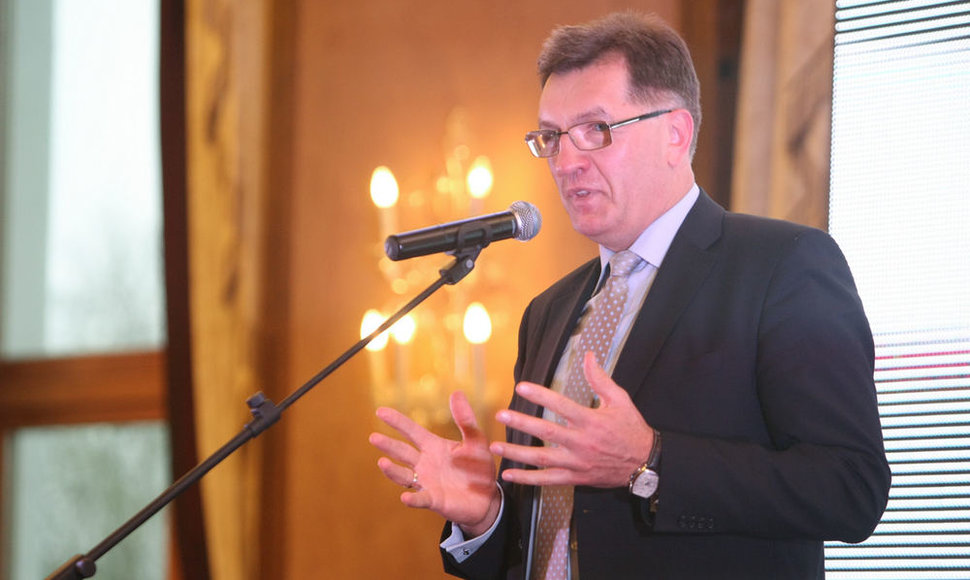The minute he was appointed the leader of the Government, social democrat Butkevičius became a darling of those who have made it their hobby – or a living – to make fun of Lithuanian politics. During Butkevičius' first weeks as prime minister, hardly a day would go by without a quotation of his latest gaffe, a meme, or a cartoon going viral.
Commentators would pick on his ever-changing position on taxes, on pushing back the retirement age, on the construction of a new nuclear power plant (he would promise to build it one day, then remember the unfavourable referendum results the next; he would support energy independence one day, oppose getting into debts the next), etc.
The prime minister was very upset that the opposition started slamming his government without waiting 100 days – the accepted term for the new cabinet to warm up – and that reporters misinterpreted his statements.
Misunderstood by the media?
In April, when a task group was presenting the updated National Energy Strategy, Butkevičius made a statement that, to everyone present in the press conference, communicated a message to the effect that the new government, having halted the Visaginas NPP project last year, intended to resume it.
“Today, a decision was made in the Strategic Committee meeting: we speak in support of Lithuania being a nuclear energy country,” the prime minister told reporters. He added that the report greenlit opening talks with regional partners as well as the project's strategic investor, Japan's Hitachi, in order work out how to push down the cost of energy production in the future nuclear facility.
A few hours later, however, Butkevičius was saying something entirely different. He claimed that the media had misinterpreted him: “In fact, the Visaginas Nuclear Power Plant project is too expensive for Lithuania: we are a nuclear energy country because we have to decommission the old Ignalina Nuclear Power Plant. However, it has been clearly stated that the current Visaginas NPP project cannot be implemented because the price of electricity is too high. We therefore must inform our partners that they should decide what to do next.”
Several weeks ago, while talking on the air of Žinių Radijas (News Radio), the prime minister suggested that the three Baltic states might set up a joint venture which would be tasked with analysing all data and telling what to do.
Radio host Aurimas Perednis commented that he was puzzled: if the future of Visaginas NPP was a political decision, how could a company like that give orders to politicians about what to do?
A more general question begs itself: how come the prime minister has to explain what he has said so often? Is it his tongue that fails him or are there deeper reasons behind so much back and forth?
Good for voters and businesses
Mindaugas Kubilius, partner with Cezaris, an organizational development and communication consulting firm, comments that the current prime minister is very different from his predecessor, Andrius Kubilius, but his character does have traits that make him popular with voters.
Conservative Kubilius was better at communicating his messages, but his thought processes seemed rather obscure. Butkevičius thinks much more matter-of-factly, yet he sometimes has trouble putting his thoughts into comprehensible statements.
“The thinking of Kubilius, his visions for a modern state are intermingled with ideas of political capital growth. There is only about 30 percent of efficiency there, I'd say,” he tells 15min. “Butkevičius' head is 70-80-percent dominated by pragmatic matter-of-factly approach. The prime minister is able to express well only those decisions that are clear to himself. Oftentimes, however, when he makes public statements, he has not yet a clear idea of what he wants to say.”
When reporters catch him unprepared, Butkevičius fails to communicate his ideas clearly – and subsequently interpretations and misinterpretations multiply. But when he has a readily formulated decision, Butkevičius can speak matter-of-factly and intelligibly. According to Marius Kubilius, inability to communicate clear messages is a great failing of political communication and even state governance.
Similar failings, however, are not limited to the public sector. In business, too, the more money is involved, the longer it takes to make a decision.
“It would be irresponsible to expect that the prime minister will announce ready decisions on nuclear energy involving billions of public funds,” the expert says. “Butkevičius is cultured enough to refrain from talking if he has nothing to say. Kubilius, on the contrary, always has something to say. Meanwhile efficiency in his decisions was clearly lacking.”
He notes that, since Butkevičius came to power, the rate of reinvestment in the country has gone up – that means that businesses find the new prime minister more understandable and predictable. In other words, an improvement for the business environment.
According to Mindaugas Kubilius, when the government head has not yet defined his position, it is up to his communications team to make statements and accept criticism for them. Only once a clear position is decided upon, should Butkevičius himself come out and stand before the cameras.
“One can learn public communication: how to articulate one's thoughts clearly, control emotions, and discipline oneself. Butkevičius is manifestly growing in this respect. I can predict that, in a year or so, he will be much better at communicating what he thinks,” Mindaugas Kubilius assures.
No degree in humanities
Regina Koženiauskienė, a professor at Vilnius University, is hardly surprised by Butkevičius' convoluted and not always intelligible statements: “Well what can you expect – he is not a humanitarian.”
Koženiauskienė, an expert of rhetoric, notes that frequent changes in Butkevičius' positions are not a sign of poor oratory skills but rather of thin arguments and disregard for logic: “Whereas I do understand him perfectly when he speaks.”
According to the professor, hardly anyone in the Lithuanian political elite has taken a course in rhetoric – except perhaps those with degrees in law.
Those who do manage to sound consistent and persuasive are usually self-taught speakers. There are textbooks to help with that, she says, but public speaking is a hard skill to learn on one's own. Specialist tutoring and seminars are to be preferred.
Koženiauskienė herself is often invited by politicians and lawyers to give a lecture on the art of oratory or provide private consultations. Several years ago, she was even asked to coach the current Speaker of Parliament, Vydas Gedvilas.













